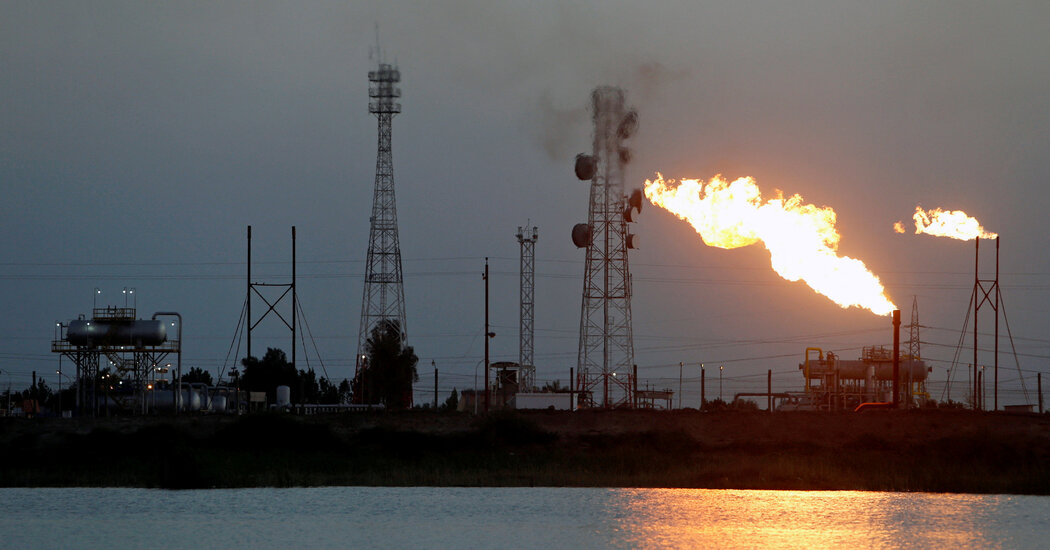Oil prices rose Monday and US officials expressed dismay a day after OPEC members announced significant production cuts, a move that reaffirmed Saudi Arabia, the group’s leader, as a wayward giant in the oil market.
Traders are bidding higher crude oil prices following news of cuts totaling more than 1.1 million barrels per day, or 1 percent of global production, starting next month. Brent crude, the international benchmark, rose more than 6 percent to nearly $84.93 a barrel. West Texas Intermediate crude, the US standard, rose by a similar amount and traded more than $80 a barrel.
Sunday’s surprise announcement was a potential new threat to global efforts to curb inflation and a challenge to the Biden administration, which has pushed for lower gasoline prices.
“We think the production cuts are not advisable at this point given the uncertainty in the market. And we made that clear,” said John F. Kirby, a spokesman for the National Security Council. “But we don’t have a seat at that table either.”
Although Mr Kirby said the White House had been given advance notice of the cut, the move could further exacerbate tense relations between the United States and Saudi Arabia. Last year, President Biden made a special appeal to Saudi Crown Prince Mohammed bin Salman in Riyadh to increase oil production, but OPEC, or the Organization of the Petroleum Exporting Countries, slashed its production at its next meeting.
An OPEC statement on Monday described the “voluntary production adjustments” as a “precautionary measure to support oil market stability.”
Saudi Arabia, OPEC’s main oil producer, said it would cut by far the most, at 500,000 barrels a day, followed by Iraq (211,000 barrels), the United Arab Emirates (144,000 barrels) and five other countries.
Inflation FAQs
What is Inflation? Inflation is a loss of purchasing power over time, meaning your dollar won’t go as far tomorrow as it did today. It is usually expressed as the annual change in prices for everyday goods and services such as food, furniture, clothing, transport and toys.
The abrupt move showed Saudi Arabia’s determination to be proactive in keeping prices high, perhaps around $90 a barrel, some analysts said.
“This is a new Saudi style of unpredictable maneuvering,” said Karen Young, a senior fellow at Columbia University’s Center on Global Energy Policy. In recent days, Saudi oil officials had indicated that current production levels would be maintained through the end of the year.
However, it may prove difficult to keep prices up if demand for oil falls. Monday’s shock “could be followed by the realization that the market is much weaker than people think,” wrote Edward Morse, head of commodities at Citigroup.
Uncertainties hang over the global economy. It is not clear how quickly China, Saudi Arabia’s largest oil importer and main customer, will recover from its “zero Covid” lockdowns. Also difficult to estimate is the extent of the economic damage to oil demand caused by the recent turmoil in the banking sector. And higher prices will encourage more investment and production from other producers, such as shale oil drills in the United States.
Gasoline prices in the United States have been creeping higher in recent weeks.
By moving now, the Saudis are signaling that they prefer to act rather than wait and see how these trends develop, some analysts said.
“This is probably not their last production move of the year,” said Mr. morse.
OPEC Plus, made up of OPEC, Russia and a few others, produces about half of the world’s oil. In February, Russia said it would cut production by 500,000 barrels a day in response to Western sanctions that have swayed demand for its oil.
Overall, the group had not scheduled a formal meeting of oil ministers until June, but the Saudis apparently decided action was needed. Prices have been weak lately, although they recovered slightly in recent days as the banking problems seemed to ease. A dispute between Iraq and Kurdistan disrupted some oil supplies last week, but a possible settlement was announced over the weekend.
The sight of a price drop to $70 a barrel in mid-March was likely alarming for the Saudis, and analysts say they may have decided to act before more bad news pushes markets further down. Saudi Arabia needs high oil revenues to support ambitious development programs aimed at diversifying the kingdom’s economy away from oil.
Some analysts say the Saudis had little choice but to act.
“This move by OPEC Plus appears to be restoring its credibility as a proactive, preemptive force,” said Gary Ross, CEO of Black Gold Investors, a trading firm.
What is clear is that the Saudis are likely to take steps they decide are in their best interests, even if their decisions irritate the Biden administration and complicate the efforts of the US Federal Reserve to reduce inflation.
Relations between Washington and Riyadh have been further complicated by China’s growing presence in the region, including its role as a mediator in a recent series of secret talks that led to rapprochement between Saudi Arabia and Iran.
On Monday, Mr Kirby, the spokesperson for the National Security Council, warned not to read too much into the latest disagreement.
“Saudi Arabia is still a strategic partner, as they have been for 80 years,” he said. “We don’t always agree on everything, but on many things that concern us mutually, we find ways to work together,” he said, pointing to efforts to extend the ceasefire in Yemen.
But Helima Croft, an analyst at RBC Capital Markets, noted a difference in attitude in Riyadh.
“It is clear that Saudi Arabia is willing to put up with more friction in the bilateral relationship,” she wrote in a note to clients.
Ms Croft said the Saudis now view Washington as “just one partner among many” rather than their main ally as in the past.
Julian E Barnes reporting contributed.

